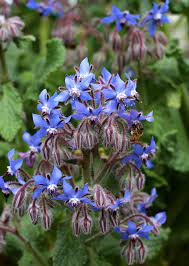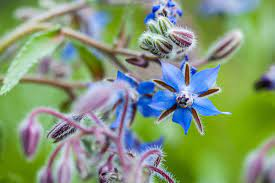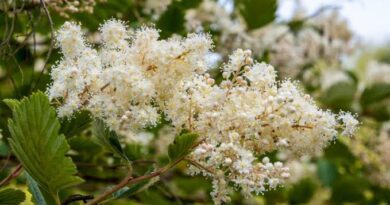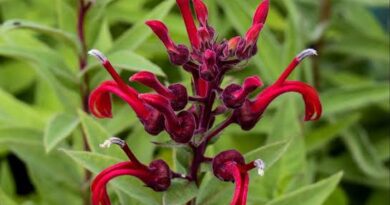20 Medicinal Health Benefits Of Borage (Borago officinalis)
Borage (Borago officinalis) is a charming herb with bright blue, star-shaped flowers, native to the Mediterranean region but now cultivated in various parts of the world.
This herb is not only appreciated for its ornamental value but also for its historical uses in culinary, medicinal, and cosmetic applications.
In the culinary realm, borage is known for its mild cucumber-like flavor. Its leaves and flowers are edible, and they are often used as a garnish in salads, soups, and drinks. Borage is rich in gamma-linolenic acid (GLA), an essential fatty acid, making it a nutritious addition to the diet.
In traditional medicine, borage has been esteemed for its medicinal properties. The plant contains various bioactive compounds, including polyphenols and essential oils, contributing to its potential health benefits.
One notable aspect is its anti-inflammatory properties, which have been traditionally harnessed to alleviate symptoms of inflammatory conditions.
Borage is also recognized for its potential to support skin health. The GLA content in borage oil is thought to contribute to the maintenance of healthy skin by promoting moisture retention and addressing skin conditions such as eczema. Additionally, the plant has been used topically in the form of poultices to soothe irritated skin.
The herb is considered a gentle diuretic, promoting the elimination of excess fluids from the body. This diuretic action has historical applications in addressing mild edema and supporting kidney function.
Moreover, borage has been associated with mood-enhancing effects. The GLA it contains is a precursor to prostaglandins, which play a role in regulating inflammation and various physiological processes, including those related to mood and stress. While more research is needed, these properties have led to the historical use of borage as a mild mood enhancer and stress-reliever.
It’s important to note that, as with any herbal remedy, individuals should exercise caution, and it’s advisable to consult with healthcare professionals, especially if pregnant, nursing, or taking other medications.
While borage has a history of traditional use and potential health benefits, scientific research is ongoing to further understand its mechanisms of action and efficacy.
The Botanical Description of Borage
1. Plant Structure: Borage (Borago officinalis) is an annual herb that grows upright, reaching a height of 1 to 3 feet. It features a bushy appearance with branched stems covered in coarse, bristly hairs.
2. Leaves: The plant’s leaves are large, oval-shaped, and alternate along the stem. They are notable for their vibrant green color and rough texture.
3. Flowers: Borage produces striking blue, star-shaped flowers, which are not only aesthetically pleasing but also attract pollinators like bees. Each flower has five petals and is accompanied by bright green sepals.
4. Roots: Borage has a taproot system, allowing it to access nutrients from deeper soil layers. The roots are relatively shallow during the early stages of growth.
5. Fruits: After flowering, borage develops small, black, wrinkled seeds within nutlets. These seeds are the primary means of propagation.
6. Growth Conditions: Borage thrives in well-drained soil with good sunlight. It’s known for its resilience and ability to adapt to various climates.
7. Growing Season: Borage typically blooms in late spring to early summer. It is known for self-seeding, meaning that new plants can emerge without additional sowing.
8. Fragrance: The plant has a mild cucumber-like fragrance, contributing to its appeal in culinary and medicinal applications.
9. Folklore Significance: Borage has historical significance, with its mention in folklore and literature. It was believed to bring courage and joy, leading to its common name, “herb of gladness.”
The Geographic Distribution of Borage

1. Native Regions: Borage is native to the Mediterranean region but has been naturalized in many parts of the world. Its historical cultivation and use can be traced back to ancient civilizations.
2. Global Spread: Beyond its native habitat, borage has been introduced and cultivated in North America, Europe, Asia, and other temperate regions.
3. Cultivation in Gardens: Due to its adaptability, borage is a common feature in gardens worldwide. Its self-seeding nature makes it an easy-to-maintain addition.
4. Climate Preferences: Borage prefers a Mediterranean climate, characterized by mild, wet winters and hot, dry summers. However, it can tolerate a range of conditions.
5. Naturalization: Borage has naturalized in various regions, particularly in disturbed habitats, along roadsides, and in fields.
6. Agricultural Uses: Apart from its presence in gardens, borage is cultivated commercially for its culinary and medicinal applications.
7. Historical Significance: The plant’s historical connection to the Mediterranean region has influenced its cultural and culinary significance in those areas.
8. Borage as an Invasive Species: In some regions, borage can display invasive tendencies, spreading rapidly and outcompeting native vegetation.
The Chemical Composition of Borage
1. Gamma-Linolenic Acid (GLA): Borage is renowned for its high GLA content, an essential fatty acid with anti-inflammatory properties.
2. Pyrrolizidine Alkaloids: Borage contains trace amounts of pyrrolizidine alkaloids, which can be toxic in large quantities. However, the levels are generally low and considered safe for consumption.
3. Tannins: Tannins, with their antioxidant properties, are found in borage. These compounds contribute to the plant’s medicinal benefits.
4. Vitamins and Minerals: Borage is a rich source of vitamins, including vitamin C, and minerals such as potassium and calcium.
5. Flavonoids: The plant contains flavonoids, contributing to its antioxidant and anti-inflammatory properties.
6. Essential Oils: Borage produces essential oils, adding to its fragrance and potential therapeutic uses.
7. Nitrogenous Compounds: Borage’s chemical composition includes various nitrogen-containing compounds, influencing its medicinal properties.
8. Phenolic Compounds: Phenolic compounds, known for their antioxidant activity, are present in borage.
9. Silicic Acid: Borage contains silicic acid, contributing to its potential benefits for skin health.
10. Carbohydrates: The plant contains carbohydrates, providing a source of energy.
11. Proteins: Borage contains proteins, although in moderate amounts.
12. Fiber: Borage contains dietary fiber, contributing to digestive health.
Read Also: 19 Medicinal Health Benefits Of Ashwagandha (Withania somnifera)
The Medicinal Health Benefits Of Borage (Borago officinalis)

1. Anti-Inflammatory Properties: Borage is recognized for its anti-inflammatory effects, primarily attributed to its high GLA content. This makes it beneficial for conditions like rheumatoid arthritis.
2. Skin Health: The presence of silicic acid and essential oils in borage makes it beneficial for skin health. It is used in traditional medicine for conditions like dermatitis and eczema.
3. Respiratory Health: Borage has been employed to support respiratory health, particularly in easing symptoms of coughs and bronchitis.
4. Cardiovascular Support: The plant’s omega-6 fatty acids contribute to cardiovascular health by helping regulate cholesterol levels.
5. Hormonal Balance: Borage is known to support hormonal balance, making it beneficial for conditions like premenstrual syndrome (PMS).
6. Mood Enhancement: Historical beliefs in borage’s ability to bring courage and joy hint at its potential mood-enhancing properties.
7. Diuretic Properties: Borage acts as a mild diuretic, promoting the elimination of excess fluids from the body.
8. Gastrointestinal Aid: The fiber content in borage may contribute to digestive health by promoting regular bowel movements.
9. Antioxidant Effects: Borage’s flavonoids and tannins contribute to its antioxidant properties, protecting cells from oxidative stress.
10. Immune System Support: The plant’s nutrients, including vitamins and minerals, support overall immune system function.
11. Anti-Cancer Potential: Some studies suggest that borage may have anti-cancer properties, although more research is needed in this area.
12. Anti-allergic Properties: Borage has been studied for its potential anti-allergic effects, which may be attributed to its anti-inflammatory compounds.
13. Antimicrobial Action: Borage has demonstrated antimicrobial activity, making it a potential natural remedy for certain infections.
14. Bone Health: The presence of minerals like calcium in borage contributes to bone health.
15. Weight Management: The fiber content in borage may aid in weight management by promoting a feeling of fullness.
16. Anti-Anxiety Effects: While more research is needed, some studies suggest that borage may have anti-anxiety effects.
17. Liver Health: Compounds in borage may support liver health by promoting detoxification processes.
18. Anti-Aging Properties: The antioxidant content in borage may contribute to anti-aging effects.
19. Vision Support: Borage contains nutrients beneficial for eye health, including vitamin C.
20. Diabetes Management: Some studies indicate that borage may help in managing diabetes, although more research is required.
The Methods of Usage to Achieve the Provided Health Benefits Of Borage (Borago officinalis)
1. Culinary Applications: Borage leaves and flowers are edible, with a mild cucumber flavor. They can be used in salads, soups, and beverages, adding a refreshing twist to culinary creations.
2. Herbal Tea: Borage leaves can be used to make a soothing herbal tea. The tea is believed to have calming effects, making it a popular choice for those seeking relaxation.
3. Infused Oil: Borage oil, extracted from the seeds, is rich in GLA. This oil is often used topically for skin conditions and can be infused for culinary purposes.
4. Poultices: Crushed borage leaves can be applied as poultices to soothe skin irritations, bites, or minor wounds. The anti-inflammatory properties aid in promoting healing.
5. Tinctures and Extracts: Borage can be prepared as tinctures or extracts, preserving its medicinal properties. These liquid forms allow for easy dosage and application.
6. Supplements: Borage supplements, available in various forms such as capsules or oil, provide a convenient way to incorporate its health benefits into one’s routine.
7. Salves and Creams: Borage-infused salves and creams are popular for addressing skin issues. They are applied topically to moisturize and alleviate conditions like eczema.
8. Respiratory Steam: Inhaling steam infused with borage can help relieve respiratory discomfort. This method is often employed to ease symptoms of colds and congestion.
9. Culinary Garnish: The vibrant blue flowers of borage make for an attractive and edible garnish in various dishes, enhancing their visual appeal.
10. Aromatherapy: Borage’s mild cucumber scent makes it suitable for aromatherapy. Essential oils or dried borage flowers can be used in diffusers for a calming ambiance.
The Side Effects Of Using Borage Medicinal Plant
1. Liver Toxicity: Prolonged or excessive consumption of borage, especially in the form of supplements, may pose a risk of liver toxicity due to the presence of pyrrolizidine alkaloids.
2. Allergic Reactions: Some individuals may experience allergic reactions to borage, leading to symptoms like skin rashes, itching, or difficulty breathing. It’s crucial to monitor for any adverse effects.
3. Gastrointestinal Discomfort: In some cases, the consumption of borage can result in gastrointestinal discomfort, including nausea, vomiting, or diarrhea.
4. Pregnancy and Lactation: Pregnant and breastfeeding women should avoid borage, as its safety during these periods is not well-established. The potential effects on fetal development and infants are uncertain.
5. Interaction with Medications: Borage supplements may interact with certain medications, including blood-thinning medications. Consultation with a healthcare professional is advisable, especially for those on medication regimens.
6. Photosensitivity: Borage contains compounds that may increase sensitivity to sunlight. Individuals using borage preparations should take precautions to avoid excessive sun exposure.
7. Not for Long-Term Use: Due to the presence of pyrrolizidine alkaloids, it’s recommended not to use borage supplements for an extended period. Short-term use under supervision is advisable.
8. Potential Harm to Pets: Ingesting borage may be harmful to pets, particularly in larger quantities. Pet owners should be cautious about pets accessing borage plants.
9. Not Recommended for Children: The safety of borage for children is not well-established. It’s advisable to consult with a healthcare professional before giving borage preparations to children.
10. Blood Pressure Concerns: Individuals with blood pressure concerns should use borage cautiously, as it may have diuretic effects and could potentially affect blood pressure levels.
11. Kidney Health: Those with kidney issues should exercise caution when using borage, as its diuretic properties may impact kidney function.
12. Not a Substitute for Professional Medical Advice: While borage has medicinal properties, it should not be used as a substitute for professional medical advice, diagnosis, or treatment. Individuals with pre-existing health conditions should consult healthcare professionals.
Read Also: 20 Medicinal Health Benefits of Vernonia amygdalina (Bitter Leaf)
The Scientific Research and Studies of Borage

1. Anti-Inflammatory Effects: Scientific studies have explored borage’s anti-inflammatory properties, attributing them to the presence of gamma-linolenic acid (GLA). This makes it a subject of interest for conditions like arthritis.
2. Skin Health: Research indicates that borage oil may benefit skin health by improving moisture and reducing inflammation. It has been studied for conditions such as atopic dermatitis.
3. Respiratory Health: Studies suggest that borage may have potential benefits for respiratory health, including the relief of coughs and respiratory distress.
4. Cardiovascular Health: The omega-6 fatty acids, particularly GLA, in borage have been investigated for their potential role in supporting cardiovascular health.
5. Hormonal Regulation: Borage has been studied for its effects on hormonal balance, particularly in women experiencing premenstrual symptoms.
6. Mood and Anxiety: Some research has explored the traditional beliefs in borage’s mood-enhancing effects, with studies suggesting potential anti-anxiety properties.
7. Diuretic Effects: Scientific investigations have validated the mild diuretic effects of borage, supporting its traditional use for promoting fluid elimination.
8. Antioxidant Properties: The antioxidant properties of borage, attributed to flavonoids and tannins, have been examined in various studies.
9. Anti-Cancer Potential: While preliminary studies suggest anti-cancer potential, further research is needed to understand the specific mechanisms and potential applications.
10. Antimicrobial Activity: Research has demonstrated the antimicrobial activity of borage, showcasing its potential in addressing certain infections.
11. Liver Support: Some studies suggest that borage may offer support to liver health by promoting detoxification processes.
The Safety Precautions and Recommendations In Using Borage Medicinal Plant
1. Consultation with Healthcare Professionals: Before incorporating borage into a health regimen, individuals, especially those with pre-existing health conditions or on medications, should consult healthcare professionals.
2. Moderation is Key: While borage offers health benefits, moderation is crucial. Excessive or prolonged use, especially in supplement form, may lead to adverse effects.
3. Source Quality: Ensure that borage supplements are sourced from reputable manufacturers, and quality standards are maintained to minimize the risk of contaminants.
4. Pregnancy and Lactation: Pregnant and breastfeeding women should avoid borage due to uncertainties regarding its safety during these periods.
5. Monitor for Allergic Reactions: Individuals using borage should monitor for any signs of allergic reactions, and if observed, discontinue use and seek medical attention.
6. Short-Term Use: Borage supplements should ideally be used for short durations under the supervision of healthcare professionals, especially considering the presence of pyrrolizidine alkaloids.
7. Sun Protection: Individuals using borage should take precautions against increased sensitivity to sunlight by using sunscreen and protective clothing.
8. Keep Out of Reach of Pets: If cultivating borage at home, take precautions to ensure that pets do not have access, as ingestion may be harmful to them.
9. Children’s Usage: Exercise caution when considering borage for children, and consult healthcare professionals for guidance.
10. Monitoring Blood Pressure: Individuals with blood pressure concerns should monitor their blood pressure levels when using borage, as it may have diuretic effects.
11. Kidney Function: Individuals with kidney issues should be cautious, as borage’s diuretic properties may impact kidney function.
12. Not a Substitute for Professional Advice: Emphasize that borage, while offering potential health benefits, is not a substitute for professional medical advice, and individuals should seek guidance from healthcare professionals.
FAQs About Borage Medicinal Plant
1. Is borage safe for pregnant women?
While borage has been traditionally used for various health benefits, it is not recommended for pregnant women due to potential risks. The safety of borage during pregnancy is uncertain, and it’s advisable to consult with a healthcare professional before considering its use.
2. Can borage be used for skin conditions?
Borage, especially in the form of oil, has been studied for its potential benefits in addressing skin conditions such as dermatitis and eczema. However, individual reactions vary, and it’s essential to perform a patch test and consult with a dermatologist if considering its use for skin health.
3. What precautions should be taken for borage supplements?
When using borage supplements, it’s crucial to follow recommended dosages and seek products from reputable sources. Due to the presence of pyrrolizidine alkaloids, long-term or excessive use should be avoided. Consultation with a healthcare professional is advisable, especially for those with pre-existing health conditions.
4. Can borage be used for anxiety?
Some studies suggest that borage may have mood-enhancing and potential anti-anxiety effects. However, further research is needed to establish its efficacy for anxiety disorders. Individuals considering borage for anxiety should consult with healthcare professionals.
5. How does borage support cardiovascular health?
Borage contains gamma-linolenic acid (GLA), an omega-6 fatty acid known for its potential cardiovascular benefits. GLA may contribute to regulating cholesterol levels, supporting heart health. However, individuals with cardiovascular conditions should consult healthcare professionals before using borage supplements.
6. Are there any age restrictions for using borage?
While borage has been used traditionally for various health benefits, age-specific recommendations are not well-established. Consultation with healthcare professionals is advised, especially for children and the elderly, to determine suitability and appropriate dosage.
7. Can borage be toxic to pets?
Yes, borage can be toxic to pets if ingested in significant quantities. Pet owners should take precautions to prevent pets from accessing borage plants. In case of ingestion, seek veterinary assistance promptly.
8. Is borage oil beneficial for hair health?
While borage oil is rich in gamma-linolenic acid (GLA) and other nutrients, more research is needed to establish its specific benefits for hair health. Individual responses vary, and consulting with a dermatologist or healthcare professional is recommended for personalized advice.
9. How can borage be included in a daily diet?
Borage leaves and flowers are edible and can be used in salads, soups, and beverages for a mild cucumber flavor. Additionally, borage oil can be incorporated into culinary creations or taken as a supplement. However, moderation is key, and individuals with dietary restrictions or health concerns should seek guidance from healthcare professionals.
10. Can borage interact with medications?
Yes, borage supplements may interact with certain medications, including blood-thinning medications. Individuals on medication regimens should consult with healthcare professionals before using borage to avoid potential interactions.
11. Is borage recommended for individuals with liver conditions?
Due to the potential risk of liver toxicity associated with pyrrolizidine alkaloids present in borage, individuals with liver conditions should exercise caution. Consultation with healthcare professionals is advisable before considering the use of borage supplements.
12. Can borage be used for weight management?
The fiber content in borage may contribute to a feeling of fullness, potentially supporting weight management. However, individual responses vary, and incorporating a balanced diet and regular exercise is crucial for overall weight management.
13. How can borage be grown at home?
Borage is relatively easy to grow at home. It prefers well-drained soil and ample sunlight. Seeds can be sown directly in the garden or in containers. The plant is known for self-seeding, and once established, it requires minimal maintenance.
14. Are there any specific considerations for individuals with allergies?
Individuals with known allergies, especially to plants in the Boraginaceae family, should exercise caution when using borage. Performing a patch test and monitoring for any allergic reactions is advisable.
15. Can borage be used for diabetes management?
Some studies indicate that borage may have potential benefits for diabetes management, but further research is needed to establish its efficacy. Individuals with diabetes should consult with healthcare professionals before considering borage supplements.
16. Is borage recommended for individuals with respiratory conditions?
Borage has been traditionally used to support respiratory health, and studies suggest potential benefits for easing symptoms of coughs and bronchitis. However, individuals with respiratory conditions should consult healthcare professionals for personalized advice.
17. Can borage be used as an insect repellent?
While borage is not typically recognized as a strong insect repellent, some anecdotal evidence suggests that its fragrance may have mild repellent effects. It can be planted in gardens to potentially deter certain insects.
18. What should be considered when using borage for the first time?
Individuals using borage for the first time should start with small amounts to assess tolerance and potential allergic reactions. If using supplements, following recommended dosages is crucial. Any unusual symptoms should be reported to healthcare professionals.
19. Can borage be used in combination with other herbs or supplements?
Combining borage with other herbs or supplements should be done cautiously, considering potential interactions. Individuals using multiple herbal remedies or supplements should consult with healthcare professionals to ensure compatibility and safety.
20. Is it safe to drive or operate machinery after using borage?
As of current knowledge, there is no evidence to suggest that using borage impairs the ability to drive or operate machinery. However, individual responses vary, and users should assess their own reactions before engaging in activities that require attention and focus.
Read Also: Is the Saltwater Crocodile a Threat to Humans?









